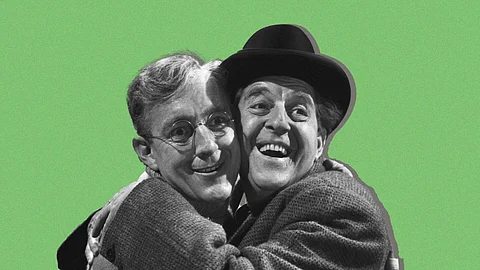
- Reviews
- Power List 2024
- Cannes 2024
- In-Depth Stories
- Web Stories
- News
- FC Lists
- Interviews
- Features
- FC SpecialsFC Specials

One is always haunted by the thought of his cherished and admired films remade by some incompetent director, enacted by dull-looking actors and produced by a greedy Hollywood studio. It’s a nightmare founded on fact – most remakes of enviably good films prove to be abysmal experiences. Yet in the case of the truly great films, Sir David Lean’s epics for instance or even classic war films, this fear can be placated by a knowing assumption – that these remakes will always be uniformly inferior to the great films they try to imitate. The meticulously filmed vistas and equally majestic performances of Lawrence Of Arabia (1962) will always stand tall above the second-rate,computer-generated imagery and bogus political attitudes of a remake.
It is the simpler, smaller cinematic delights, alas, that are in real danger of being remade as inferior but still successful films with pompous celebrities instead of talented actors. It still hurts to realise, for instance, that Steven Soderbergh’s Ocean’s 11 (a film that one could only enjoy in one’s ignorant adolescence), itself a remake of a Rat Pack comedy, is considered to be the first “wisecracking robbery film”, whereas some five decades before, a lesser-known but immeasurably more enjoyable and memorable film from across the Atlantic Ocean had a splendid blend of elegant wit, pitch-perfect slapstick and even an element of polished satire. It feels unfair to think that The Lavender Hill Mob (1951) might be almost unfamiliar to today’s audiences and it feels even more morbid to imagine its very English character ruined by a Hollywood remake.
Far away from the crudely titillating casinos of Las Vegas, Charles Crichton’s film is set in good old London of the post-war years. It follows Henry Holland (Alec Guinness), a mild-mannered bank clerk, and Alfred Pendlebury (Stanley Holloway), a poetry-quoting maker of antique souvenirs – two men who together concoct a wickedly wonderful plan in their Lavender Hill lodgings. The robbery – a hoot with simple ingenuity and without any expensive gadgets or gimmicks – succeeds but soon things go hilariously, audaciously wrong. The film’s real comedic genius then breaks out not only in the effortlessly witty repartee between the two men but also in a never-ending spree of jokes and gags fresh out of a Wodehouse novel – from a frustrating rigmarole of bureaucracy before boarding a ship at the last minute to a side-splitting chase of police cars in the end.
Douglas Slocombe, the legendary Ealing photographer, captures the comic frenzy of these situations with customary style, even shooting a dizzying scramble down the Eiffel Tower, while T.E.B Clarke’s script is not only clever but also convincing in its warm empathy towards these gentlemen thieves. Holloway’s Pendlebury is a hearty delight, but it is Guinness as Holloway, who endears even more, be it as the not-so-innocent bowler-hatted Londoner reading a thriller to his fellow lodger or the dainty Englishman enjoying his spoils in one of Kipling’s “thoughtful islands where never warrants come.”
It would be a shame then if some Hollywood producer would take this little lovable English gem and transform it into something obscenely rich and ultimately unnecessary (as in the case of how they nearly ruined another Ealing classic by remaking The Ladykillers). It feels even like a bastardisation of the film’s cultural identity, like how John Sturges remade Akira Kurosawa’s epic Seven Samurai (1954) into the monotonous The Magnificent Seven (1960), filled with only popular cowboy faces. An Ealing comedy is as English or British as a plate of fish and chips; the humour and context of the pratfalls is as recognisably located in London as the films of our very own Basu Chatterjee and Dibakar Banerjee are located in Bombay and Delhi respectively. To turn that into something crassly American, with just a slew of painted faces and pumped bodies, instead of characters both flawed and admirable, feels criminal. Already, The Italian Job (1969), starring the timeless Sir Michael Caine, has been remade with the excruciatingly dour Mark Wahlberg. One dreads the moment when they will hear of a new film by Soderbergh called The Beverly Hills Mob.